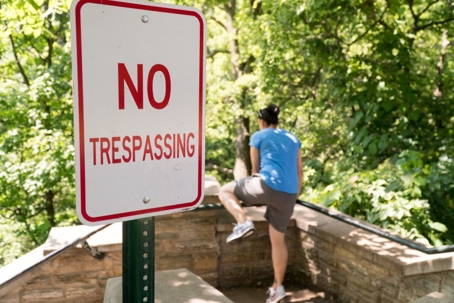Many of us have heard the urban legend about the burglar who enters a home illegally, hurts themselves, sues the homeowner, and walks away with more money than they intended to steal.
Legally, this story is a little far-fetched, but there is a grain of truth to it. In some situations, a trespasser may have grounds to sue the owner of the proper they invaded.
The two principles a trespasser can use are a reasonable expectation of safety and the attractive nuisance doctrine.
Expectation of Safety
In personal injury law, you often come across the term “reasonable expectation.” This refers to the fact that people should not be on the lookout for bizarre exceptions that could hurt them. For example, most people who visit a property would not expect a tripwire full of nails laying at the entrance.
This rule applies to trespassers as well as visitors. Imagine a trespasser entering your property. They have no reason to be aware of the dangers you regularly avoid. You know about the weak floorboard on the stairs and the oil spill that you haven’t cleaned in the garage. If a trespasser hurts themselves on one of these items, they probably don’t have solid ground to file a lawsuit.
On the other hand, imagine that you set up unexpected traps for a trespasser. You have the nail wire at the door, mentioned earlier. Also, you’ve lined the hallway with mousetraps, and you but hidden beartraps along the path to your door. These are bizarre, unexpected dangers that no reasonable person would expect to encounter.
For certain, you have the right to put whatever you want on your property If you choose to lay traps for intruders, however, you must provide a warning. This is why you see “beware of dog” signs on property. Most likely, the owner is not concerned about the safety of invaders. They are probably just protecting themselves from potential lawsuits. If you have odd, expected traps on your land, you must tell potential intruders beforehand.
The Attractive Nuisance Doctrine
The law recognizes that children are underdeveloped. They cannot always comprehend the consequences of their actions, and they can be drawn to things that are harmful to them. Thus, the attractive nuisance doctrine was born. If you have dangerous items on your property that could lure small children into danger, you may be liable for their injuries.
Imagine you have an empty refrigerator on our property. It’s yours; it’s sitting out until you can deal with it; and it’s not bothering anyone. In the eyes of the law, however, this is a false assumption. A child can see that refrigerator as an opportunity to play and explore, get stuck inside, and get hurt. If that happens, you could be held responsible.
Unfortunately, there exists no master list of items or situations that could be considered an attractive nuisance. The best way to avoid being accused of this is to overlook your property and ask yourself, “Is there anything her that a kid would want to play with?” If you see something, remove it. Put it in a place kids cannot access. Another option is to put sturdy barriers between your property and the outside world. This is why you see screens around many swimming pools. Yes, it keeps mosquitos from getting it, but it also keeps kids out.
If you choose to put up barriers, make sure they are sound. Any homes or gaps could be exploited by children. The holes and gaps themselves could be considered an attractive nuisance, so keep that in mind.
Contacting a Lawyer
Even if you found yourself in a situation you shouldn’t have been, you have a right to safety. If you’ve been hurt by another’s negligence, you should consult a lawyer. Be honest. Tell them the entire situation without holding anything back. In the long run, it will help if everyone knows the whole story, especially from a legal perspective. You may be entitled to compensation for your injuries, no matter the situation.
If you’ve been harmed on someone else’s property, reach out to us today for a free consultation. You can reach us onlineor at (305) 783-3301.

